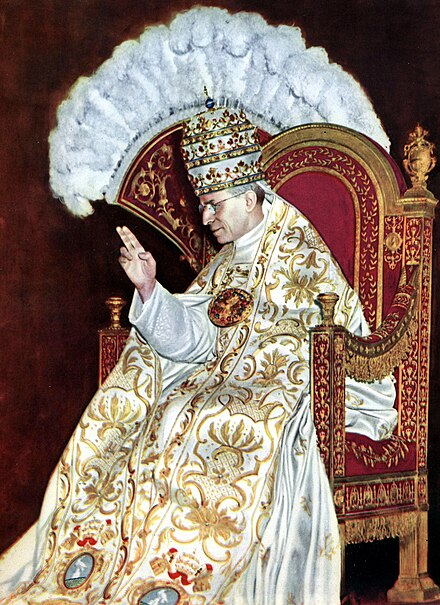 |
| Pius XII in the sedia gestatoria |
Just attended a poetry reading on the theme of poverty. Unfortunately, after a dozen poets had read their poems, the meeting devolved into a political meeting, with the hosts insisting that the problem was systemic, that it was about intersectionality and some having special privilege, and—revealing quote—“the real problem is not poverty, but abundance.”
It is not that the left wants to help the poor; it envies the rich.
Perhaps a dozen poets read. Only four were “white.” Only two spoke of personal experiences of poverty. Both were white.
Despite this, as if deaf, the hosts asserted afterwards in their political speech that poverty exists because white people, along with straights, and men, have a systemic advantage.
In fact, the Canadian immigration system favours the wealthy and well-educated among immigrant groups. We are importing the upper classes. And being rich in a poor country means far more privilege than being rich in Canada. Once they arrive, these non-white immigrants are systematically given privileges over those, primarily “white” who have been here for generations; in the name of “affirmative action” and “equity,” they are systematically favoured in hiring and promotion.
I once challenged a Pakistani immigrant of my acquaintance, a grad student at U of T.
“Why do you say you are discriminated against?”
“Because I’m not yet a member of the Granite Club.”
Another claimed oppression becuase he was not yet a full partner at his accounting firm.
So it is no surprise that it is the “whites” in any random group of Canadians who have known poverty. The usual claims we hear about “intersectionality” are the opposite of the truth.
In the same way, gays are privileged over “straights,” not just now, but throughout our history. A gay man has no wife and kids to support. A gay couple generates double incomes with no children. In the traditional sex-segregated workplace of days gone by, a gay man or woman could trade sexual favours for advancement.
Women are traditionally privileged over men, and always were. In a conventional family, they got to spend 80% of the family’s shared wealth. They had a legal right to support if they chose not to work. They had more free time--demonstrated by their much higher purchase of magazines and books, and that the vast majority of TV programming was aimed at them. Men have always been the working class; and expendable in war or in dangerous jobs.
In other words, the modern social hierarchy called “intersectionality” systematically asserts the opposite of the truth.
One of the participants at the poetry reading, citing the recent royal funeral, went on about how wrong it was for the British royal family to possess so much wealth. Why couldn’t it be distributed to the poor?
But distributing it to the poor is not the point. Were it distributed to the poor, it would help a bit perhaps, a few pounds more for a month or a year, and then be gone forever. It would be very little per capita. On the other hand, the crown jewels, for example, are not of any great personal benefit to the Queen. She gets to wear them once, at her coronation, and then they are stored behind glass at the Tower of London for tourists to look at.
The pomp of a royal funeral, or the crown jewels, are major tourist attractions. They generate wealth. Including more wealth for the poor than a one-time distribution of state wealth would.
So the problem is not that some people are poor. The problem is that the royals are rich. The problem is envy. The relatively rich always envy the richer. The poor have no such ambitions. They only want enough. The poor delight in the chance for a celebration now and then, to pull them out of their sordid daily lives; just as it is the poor who will invest in a lottery. To them, it is worth the penny for the fantasy.
One participant in the political discussion was similarly shocked by a scene she said she saw in the Vatican. Women were tearing off their jewellery and throwing it at the pope in his chair.
I have some doubts she actually saw this. The pope has not promenaded in a chair since John XXIII. But if she did see it, what was she seeing? Not the accumulation of wealth, but relatively wealthy people—wealthy enough to own valuable jewellery—surrendering their wealth. The pope was not going to wear that jewellery, was he? The pope does not get to live a particularly luxurious life. The jewellery, if it was collected, was more likely to go to the poor, through Catholic charities. And if not to the poor, to the church rather to any individual. To churches, open for anyone to enjoy.
People who are up to no good will always assert the opposite of the truth. And, if anyone corrects them, will set up an ungodly howl.
Accordingly, I bit my tongue. Such is the price of life in society. The most I dared do was post in the comments section "the real underlying problem is poverty of meaning."
Instead, I go home and post on my blog.












No comments:
Post a Comment